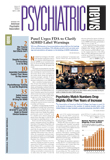Adolescent girls with high levels of depressive symptoms are almost twice as likely as peers with lower symptom levels to experience physical abuse in the context of an intimate relationship as young adults, according to the results of a longitudinal study of more than 1,600 young women around the country.
The findings, described in the March Archives of Pediatric and Adolescent Medicine, reinforce the importance of preventing, identifying, and treating depression in adolescent girls, according to the researchers.
Jocelyn Lehrer, Sc.D., and colleagues analyzed data from a large survey called the National Longitudinal Study of Adolescent Health, an ongoing study of youth health and risk behaviors involving more than 6,000 high-school and middle-school students.
Lehrer's analysis focused on data from girls in grades seven through 12 who participated in home interviews in 1995 and again from 2001 to 2002. The students came from a random stratified sample of 80 high schools. Data from students at 52 middle schools were also included. The 1,659 students selected for the analysis had a boyfriend or husband for three months or more at the time of the second interview.
Lehrer is senior research associate at the University of California, San Francisco Institute for Health Policy Studies.
Subjects' average age was about 16 at the first interview and 21 at the second.
In the first interview, researchers assessed subjects for past-week depressive symptoms using a modified Center for Epidemiologic Studies Depression Scale (CES-D), and in the second interview five years later, researchers asked the subjects whether they had been physically abused by their current partner in the preceding year.
The experience of violence was categorized as mild if the women were threatened with violence, pushed or shoved, or had something thrown at them by their partners. If the women were slapped, kicked, hit, or sustained an injury during a fight with their partner, the violence was considered to be moderate to severe.
The first interview showed that 10.2 percent of the subjects reported experiencing “high” levels of depressive symptoms, defined as a CES-D score over 23, which corresponded to an elevated likelihood of DSM-III-R major depressive disorder or dysthymia, according to Lehrer.
In the second interview, 18.6 percent of subjects reported experiencing some form of violence at the hands of their partner during the previous year.
Among those who experienced high levels of depressive symptoms in the first interview, 28 percent reported in the second interview that they were the victims of partner violence as compared with 17.5 percent of those with lower levels of depressive symptoms.
Girls with high levels of depressive symptoms were 86 percent more likely than subjects with lower symptom levels to report experiencing moderate to severe violence at the hands of their partners as young adults.
The analysis looked at several factors, including race/ethnicity, if subjects' parents completed high school, if subjects had been sexually or physically abused before the sixth grade by a parent or other adult caregiver, and if subjects were victims of dating violence or forced sex in the year before the first interview.
Lehrer speculated that depression in adolescent girls could negatively affect the decisions they make as they mature in relation to peers, education, and other factors.
“Young women with a history of depression in adolescence may be more likely to develop relationships with high-risk partners,” Lehrer told Psychiatric News.
She noted that some studies have found that adolescents and adults with depression “tend to have friends, dating partners, and spouses who have similar levels of depressive symptoms as them,” and, in turn, depressive disorders among men have been associated with a greater likelihood of“ psychological and/or physical aggression toward an intimate partner,” the report noted.
Lehrer also pointed out that “young women with a history of depression may also be less likely to exit abusive relationships or take longer” to do so.
They may be more likely to lack the social support from family or friends that is necessary to exit abusive relationships and may also be more likely to be financially dependent on their partners, she speculated.
Lehrer said the findings suggest that depression or elevated depressive symptoms in adolescence may represent “a red flag or marker for girls' increased risk of experiencing violence in an intimate relationship as young adults. Beyond this, it is possible that adolescent depression, in and of itself, may contribute to setting some girls on a pathway that leads to greater risk of experiencing violence from a future partner.”
The study was funded in part by the National Institute of Mental Health.
Arch Pediatr Adolesc Med 2005 160 270
